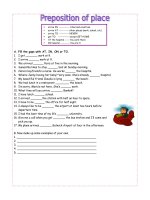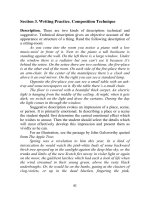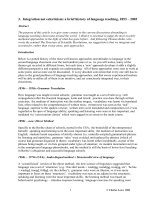Preposition of place 5 docx
Bạn đang xem bản rút gọn của tài liệu. Xem và tải ngay bản đầy đủ của tài liệu tại đây (203.96 KB, 6 trang )
►
They're throwing the armchair away.
1. ……………………………………………… 3 …………………………………………
2. ……………………………………………… 4
Phrasal verbs and one-word verbs (B)
Rewrite the sentences replacing each underlined verb with a phrasal verb.
►
We're trying to arrange a holiday together.
We're
trying to fix up a holiday
together.
Nick says he's stopped smoking.
1
How did the accident happen?
2
I think Matthew and Emma have quarrelled.
i
The problem isn't going to just disappear.
5
The government is introducing a new tax on computers.
6
Zedco want to establish a new sales office in Germany.
Business situations (C)
Complete the news article about Zedco. Put in these words:
fallen behind, fell through,
fight off, laying off, put forward, sort out, step down, taking over, taken on
Zedco Chief Executive Barry Douglas has (►)
put forward
a new plan designed to
(1) ………………………………………………
the company's problems. It is only twelve months since Zedco tried to
strengthen its position by (2)
Alpha Plastics. But the deal
(3) ……………………………………
, and Alpha managed to (4)
………………….
Zedco's attempts to
take control. Since then Zedco has performed poorly and has (5) ………………………………in the race for
market share. Managing Director James Ironside has had to (6) ………………………………
, and Barry
Douglas has (7) ……………………………… the task of rescuing the company. There are fears that the new
plan will mean (8)
staff in order to reduce expenditure.
E
xerc
i
ses
1 Phrasal verbs in everyday situations (A)
Look at the pictures and say what is happening.
Use these phrasal verbs:
dig up, pick up, plug in, throw away, wash up
Use these objects:
the armchair, litter, the plates, the road, the television
Here up has the sense of 'increasing', and on has the sense of connected'.
B Adverb meanings
Look at these adverbs and their meanings.
Remember that an adverb can have a number of different meanings.
down = becoming less on = continuing
turn down the music carry on working
bring down the cost oj living drive on a bit further
down = completely to the ground hang on/hold on a minute
knock a house down out = away, disappearing
cut down a tree wash out the dirt
down = stopping completely cross out a mistake
the car broke down blow out the candle
a factory closing down out = to different people
down = on paper hand out free tickets
copy down the words share out the winnings
write down the message out = aloud
note down the details read out the article
off = away, departing call out anxiously
set off on a journey out = from start to finish
jump in the car and drive off write out the whole list
see Emma off at the station work out the answer
the plane took off over = from start to finish
the pain is wearing off check your work over
off = disconnected think the problem over
switch off the heater up = increasing
cut off our electricity prices are going up
the caller rang off put up taxes
on = connected speak up so we can hear
switch on the kettle up = completely
turn on the TV eat up these chocolates
leave the lights on all night fill up with petrol
on = wearing count up the money
put a coat on tear up the paper
try the sweater on
130 Phrasal verbs
(
3
)
130 Exercises
i Adverb meanings (B)
Look back at B and then write the meaning of the underlined words in these sentences.
► I must get these ideas down in writing. on paper
1 Daniel finished all the cake ug.
2 I'm writing in pencil so I can rub out my mistakes.
3 Vicky didn't answer. She just went on reading.
4 I'll just read over what I've written.
5 A woman in the audience shouted something out
6 The water was turned off for about an hour today.
7 Nick's aggressive manner frightens people off.
8 The company wants to keep its costs down.
9 The embassy was burnt down by terrorists.
10 Someone will have to type all these figures out.
11 Social workers were giving out soup to the hungry.
12 Luckily Zedco's sales figures are moving up again.
13 The man was tall and dark. He had a blue jacket on.
14 Business is so bad that many firms have shut down.
2 Adverb meanings (B)
Put in the correct adverb.
► Melanie: Everything is so expensive. Prices seem to be going up all the time.
David: Yes, and the government is supposed to be bringing inflation down.
1 Laura: You shouldn't leave the television. all night.
Trevor: Sorry, I forgot. I usually turn it
2 Vicky: I've written the wrong word here.
Rachel: Well, rub it
Vicky: I can't. It's in biro. I'll have to write the whole thing ……………. again.
3 Sarah: They're going to pull …………… this beautiful old building.
Mark: I know. Some protesters were handing ……………. leaflets about it.
4 Emma: Hold…………… a minute. I thought I heard someone call
Matthew: I think you must have imagined it.
3 Adverb meanings (B)
What are they saying? Put in the phrasal verbs.
► I'm afraid the car has broken down
1 Why don't you………………………… . this coat? 3 I can't hear. Please ………………………
2 Look, the plane is ………………… 4 We're just……………………… on holiday.
131 Verb + adverb + preposition
A Simple meanings
Look at these examples.
VERB ADVERB PREPOSITION
So you've come in from the cold.
The old man fell down on the pavement.
I couldn't get through to directory enquiries.
David decided to get up onto the roof.
It was nice to go out into the fresh air.
We look out over the sea.
Everyone looked up at the aeroplane.
Vicky ran away from the fire.
B Idiomatic meanings
A verb + adverb + preposition often has a special, idiomatic meaning which isn't clear
from the individual words. Look at these examples.
Tom often calls in on/drops in on us without warning. (= pays short visits)
You go on ahead. I'll soon catch up with you. (= reach the same place as)
The police are going to clamp down on drug dealers. (= take strong action against)
I'm afraid we've come up against another difficulty. (= be stopped by)
Did Claire's trip come up to/live up to her expectations? (= Was it as good as she expected?)
The country is crying out for a new leader. (= in great need of)
We need to cut hack on our spending. (= reduce)
I'm trying to lose weight. I have to cut down on puddings. (= reduce)
They should do away with these useless traditions. (= abolish)
You've got to face up to your responsibilities. You can't just ignore them. {- not avoid)
If plan A doesn't work, we've got plan B to fall back on. (= use if necessary)
I'm tired, Mark. I don't really feel up to going out. (= have enough energy for)
We can't go on holiday together if your dates don't fit in with mine. (= go together with)
The thief managed to get away with about £2,000 in cash. (= steal and take away)
The goods are damaged. We'll have to get on to our suppliers. (= contact)
You haven't packed your suitcase yet. You'd better get on with it. (= start, continue)
Mark doesn't really get on with Alan. They're always arguing. (= have a good relationship with)
/ have lots of little jobs to do, but I can never get round to actually doing them. (= find the right time for)
I can't make a promise and then go back on it, can I? (= break, fail to keep)
Matthew has decided to go in for the ten-mile 'Fun Run this year. (= enter, compete in)
Most of the audience had left in the interval, but the actors decided to go on with the show. (= continue)
If you hold on to the rope, you'll be perfectly safe. (= keep your hands around)
Daniel was walking so fast I couldn't keep up with him. (= go as fast as)
I'm looking forward to the trip. (= thinking ahead with pleasure about)
If you're going barefoot, look out for/watch out for broken glass. (= be careful about)
I got some money from the insurance company, but nothing could make up for losing
my wedding ring. (= compensate for) I'm not going to put up
with this nonsense. (= tolerate) We've run out of milk, I'm
afraid. (= We have none left.) Are you going to send away for
your free gift? (= write to ask for)
131Exercises
1 Simple meanings (A)
Put in these words:
away from, down on, in from, out into, through to, up at, up onto
►
To reach the light bulb, Trevor had to get
up onto
the table.
1
Nick hurt himself when he was skating. He fell
. the ice.
2
It was a very long tunnel, but we finally came
the sunshine.
3
Wondering if it was going to rain, Vicky looked
the clouds.
4
People were running
the gunman as fast as they could.
5
I'm trying to phone my secretary, but I can't get
the office.
6
When I've come
the cold, I just want to sit by the fire.
2 Idiomatic meanings (B)
Put in a verb + adverb + preposition which means the same as the expression in brackets.
►
I'm afraid this product doesn't
live up to
(be as good as) the claims made in the advertisement.
1
I'll just call at the garage. I don't want to
(have none left) petrol.
2
If you want a catalogue, I'll
(write to ask for) one.
3
We'd better
(be careful about) sheep in the road.
4
1
(think ahead with pleasure about) seeing you again soon, Emma.
5
The teacher was dictating so fast we couldn't
(go as fast as) her.
6
Why should we have to
(tolerate) this awful noise?
7
It's half past twelve. I'd better
(start) making lunch.
8
Do you think the committee will
(change) their earlier decision?
9
There was a problem with the cheque, so I decided to
(contact) my bank
immediately.
10
I always like to …………………
(enter) quiz competitions.
11
I'm trying to
………………
(reduce) the amount of coffee I drink.
12
I might lose my job. And I haven't got any savings to …………………………
(use if necessary).
13
I've been meaning to reply to Rachel's letter, but I haven't managed
to
(find the right time for) it yet.
14
An apology alone cannot
(compensate for) all the inconvenience.
] Idiomatic meanings (B)
What might you say in these situations? Use the words in brackets.
►
You're tired. You can't go jogging, (don't feel up)
I don't feel up to jogging.
1
You like Melanie. The two of you are very friendly. (I get)
2
You might go and see David. It would be a short visit, (might drop)
3
You don't mind what you do. You'll do the same as everyone else. (I'll fit)
4
You are too slow. Matthew is too far ahead of you. (can't catch up)
5
The sunny weather is nice. Last week was terrible, (is making up)
TEST 22 Verbs with prepositions and
adverbs (Units 126-131)
Test 22A
Put the words in the right order to form a statement.
► I won't forget the titles of the books, down / I've / them / written
I've written them down.
1 I'll give you the money, for I I I must / my ticket / pay
2 I have to look smart, going to / I'm / on / put / that expensive grey coat 1 bought
3 Anna rang, invited / lunch / she's / to / us
4 Peter's got the photos, at / he's / looking / them
5 I wasn't allowed to go. from / leaving / me / prevented / the police
6 This programme is boring, going to / I'm / it / off / turn
Test 22 B
Decide which word is correct.
► I'm not speaking to Oliver. I've fallen out with him.
a) away b) back c) out d) through
1 Everyone complained ……………… the awful food.
a) about b) for c) on d) over
2 You don't need this word. You should cross it
a) down b) out c) over d) up
3 It's late. How much longer are you going to go ………………. working?
a) along b) on c) through d) with
4 My shoes are dirty. I'd better take them .…………… before I come in.
a) away b) off c) on d) up
5 The bus journey costs more now. They've put the fares .…………. _
a) down b) out c) over d) up
6 We all laughed the cartoon.
a) at b) for c) on d) to
7 We'd all decided to go on holiday together, but the plan fell……………… , I'm afraid.
a) away b) back c) out d) through
8 I suppose you're being nice to make ……………… the awful way you behaved yesterday,
a) away of b) down on c) in with d) up for
Test 22C
Write the correct sentence.
► Could you be a little quieter, please? I'm-trying-to concentrate at- my work.
I'm trying to concentrate on my work.
1 You haven't answered all the questions. You've-left one-away.
2 Where is Bigbury? I've-never-heard-about it.









